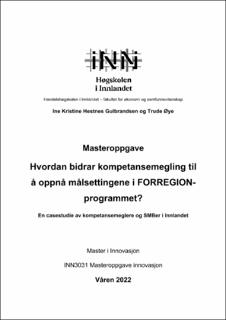| dc.contributor.advisor | | |
| dc.contributor.author | Gulbrandsen, Ine Kristine Hestnes | |
| dc.contributor.author | Øye, Trude | |
| dc.date.accessioned | 2023-04-24T16:12:01Z | |
| dc.date.available | 2023-04-24T16:12:01Z | |
| dc.date.issued | 2022 | |
| dc.identifier | no.inn:inspera:116037139:67142046 | |
| dc.identifier.uri | https://hdl.handle.net/11250/3064662 | |
| dc.description.abstract | Formålet med denne oppgaven er å undersøke om kompetansemegling bidrar til forsknings og utviklingsaktivitet i små og mellomstore bedrifter (SMB). Undersøkelsen tar utgangspunkt i mobiliseringsprosjektene i Innlandet, og med andre ord en casestudie av FORREGION Innlandet. Problemstillingen lyder som følger: “Hvordan bidrar kompetansemegling til å oppnå målsettingene i FORREGION-programmet?” For å svare på problemstillingen har det blitt utarbeidet tre forskningsspørsmål, som er forankret i litteraturen og tidligere studier på feltet. Forskningsspørsmålene skal belyse hvordan kompetansemegling foregår i praksis, om kompetansemeglingen har endret hvordan de små og mellomstore bedriftene jobber med forskning, utvikling og innovasjon, og om kompetansemeglingen har gjort dem i stand til å kombinere daglig drift med forskning og utvikling.
Hovedfunnene fra undersøkelsen viser at SMBene fikk bistand til å løse et avgrenset problem, utforming av søknader, finne finansiering, oversetting mellom SMBer og andre aktører. Det viste seg at kompetansemeglingsprosessen var ulik fra bedrift til bedrift, fordi bedriftene hadde ulike behov. Det er ingen tvil om at SMBene har endret måten de jobber med forskning, utvikling og innovasjon på, da de nå gjennomfører større og mer komplekse prosjekter. Dette er et resultat av at de har tilegnet seg forskningserfaring og nettverk som de bruker i nye FoU-prosjekter. Videre bruker SMBene virkemiddelapparatet mer aktivt, fordi de kjenner bedre til virkemiddelordningene og -aktørene. SMBene har også blitt noe flinkere til å kombinere daglig drift med forskning, utvikling og innovasjon, da de bruker mer forskning i sitt innovasjonsarbeid, men det er ledelsen som gjennomføre det meste av FoUoI-arbeidet i bedriftene.
Konklusjonen er at kompetansemegling fremmer forskning, utvikling og innovasjon i SMBer. Det er særlig kompetansemegleren oversettelsesevne, bedriftens evne til å absorbere ny kunnskap, tillit mellom aktørene og relasjonsbygging som er viktig for å få til gode samarbeid. Dette er trolig viktig elementer i enhver kompetansemeglingsprosess og derfor viktig hvis man skal lykkes med de overordnede målsetningene i FORREGION. | |
| dc.description.abstract | The purpose of this thesis is to research whether competence brokering contributes to research and development (R&D) in Small and medium-sized enterprises (SMEs). The research originates from the mobilization project in Inland County, with other words a case study of FORREGION Inland. The research question is: “How does competence brokering contribute to achieving the objectives of the FORREGION-program?”. It has developed three queries to answer the research question, which is rooted in existing literature and previous studies. The queries will shed light on how competence brokering has changed how SMEs work with research, development and innovation, and if competence brokering made the SMEs capable of combining daily operations with research and development.
The main finding from this research shows that SMEs received assistance to solve a limited problem, the layout of applications, find financing, translating between SMEs and other actors. It turned out that the competence brokering process was different from enterprise to enterprise, because the enterprises have different needs. There is no doubt that SMEs have changed the way they work with research, development and innovation, as they now carry out larger and more complex projects. This is a result of the fact that they have acquired research experience and networks that they use in new R&D projects. Furthermore, SMEs use policy implementation systems more actively, because they are better acquainted with the policy instruments and actors. SMEs have also become somewhat better at combining daily operations with research, development and innovation, as they use more research in their innovation work, but it is the management that carry out most of the R&D work in the enterprises.
The conclusion is that competence brokering promotes research, development and innovation in SMEs. It is especially the competence brokers ability to translate, the enterprises’ ability to absorb new knowledge, trust between the actors and relationship building that are important to make good cooperations. These are probably important elements in any competence brokering process and therefore important if one is to succeed with the overall objectives of FORREGION. | |
| dc.language | nob | |
| dc.publisher | Inland Norway University | |
| dc.title | Hvordan bidrar kompetansmegling til å oppnå målsettingene i FORREGION-programmet? | |
| dc.type | Master thesis | |
